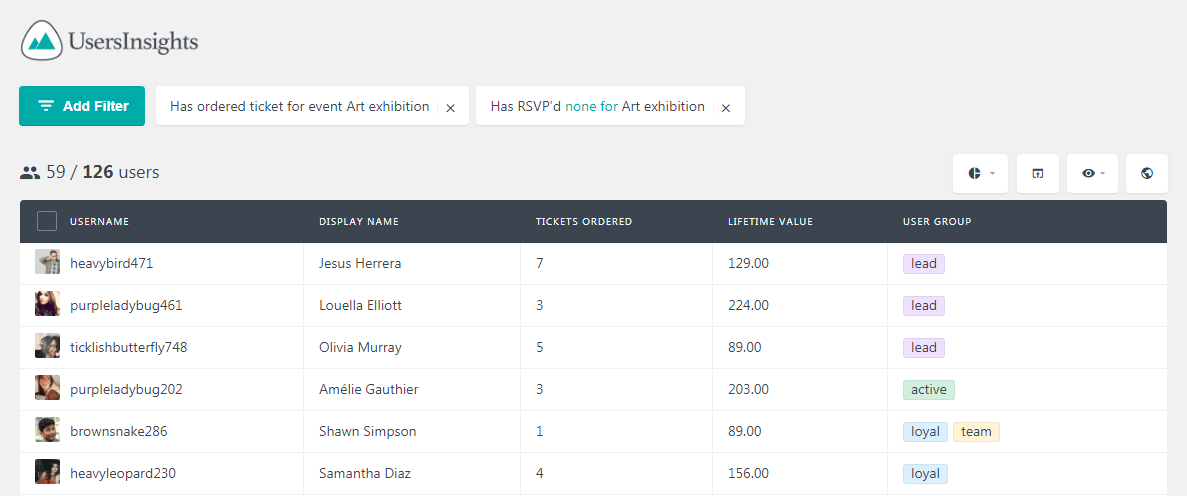How to search and filter users by ordered event tickets
If you are a small business, non-profit or just a individual that organizes events for people to attend, then the WordPress ecosystem has a plenty of solutions to offer. One on the most popular event management and calendar solution for WordPress is The Event Calendar Plugin. Using this plugin, you are able to generate events on your website and add different fields such as date, time and more information for the locals who are interested in attending the event. There are other interesting features that you can use to create and better organize your events. Using Users Insights Events Calendar integration, you can create an events calendar, manage it with ease and do a lot more.
Users Insights Events Calendar integration
Users Insights comes with an integrated Events Calendar integration that allows you to better track your users’ event activity. You are able to search and filter things like user RSVPs, number of tickets ordered and events created etc. The Events Calendar integration consists of the following features:
- General Events Calendar filters
- Event Tickets user RSVP data
- Event Tickets & Event Tickets Plus orders
Filtering users with type of tickets they have ordered
To better organize your events, you can filter out your users with the type of tickets they have ordered on your website, especially if you are running several events at a time. Using Users Insights events calendar integration, you are able to apply filters to see which users have ordered tickets for each event. To do that, first make sure that the “Tickets Ordered” column is visible. Then apply a filter “Has ordered ticket for event Art exhibition” to show users who have ordered tickets for this event.

Similarly, you can apply two filters together, “Has ordered ticket for event Art exhibition” and “Has ordered ticket for event Building big ideas” to view the users who have ordered tickets for both these events.

How to evaluate event performance and user response with Users Insights filters
There’s a saying that goes ‘If you can measure something, that means you can improve it’. Users Insights “has ordered tickets/has not ordered tickets” filter has an extended functionality using which you can evaluate both the aforementioned metrics. For example, you can apply a filter “Has ordered tickets for event Art exhibition” and sort the ‘tickets’ ordered column to see which users bought the highest and lowest number of tickets. Also, you could export these results and open these into a spreadsheet and calculate total number of tickets ordered and compare the user response on other events.
If you can’t measure it, you can’t improve it.
Similarly, you can apply the same filter on your other events to evaluate the user response and event performance. Also, you can check which of the users have RSVP’d the event to know how many users are attending it. To do that, you need to apply two filters side by side, “Has ordered tickets for event Art exhibition” and “Has RSVP’d yes for art exhibition”

In the same manner, you can get the list of users who have RSVP’d to two events simultaneously. Apply two filters “Has ordered ticket for even Art exhibition”, “Has ordered ticket for event Building big ideas” with “Has RSVP’d yes for Art exhibition” and “Has RSVP’d yes for Building big ideas”.

At times, you might feel the need to pull a list of users who have ordered tickets for a specific event but have not yet RSVP’d to the event that you have created. For that purpose, you can use the combination of filters in Users Insights “Has ordered ticket for event Art exhibition” and “Has RSVP’d none for Art exhibition”. This gives you a list of the users who have ordered tickets but have not RSVPed yet, but could do so in the future.

Filtering ticket buyers by country
It is a good practice to know in which country your tickets are being ordered most or to do a comparison of ordered tickets by country. This could be important for you because you could devise a new country specific marketing or advertising campaign to improve your event performance in underperforming countries. To get a list of users who have ordered tickets from a specific location, apply a filter “Has ordered tickets for event Art exhibition” and “Country is United States”.

Make sure to activate the geolocation module in Users Insights and then make the “Country” column visible as well.
Filtering out the most regular ticket buyers
To businesses, loyal customers are usually more valuable than the new customers. According to a research, loyal customers are worth up to 10 times the value of their first purchase. This makes it the first priority to increase the number of loyal customers also because they cost less to retain than to acquire a new customer.
For aforementioned reasons or more, if you would like to know about your regular ticket buyers, you can do so with Users Insights. First, you could get a list of your users on the basis of the number of tickets they have ordered over the time. To do so, apply a filter “Tickets ordered is bigger than 6” and sort the results in descending order.

You could further refine the results by combining it with another filter, “Lifetime value is bigger than 100”. The users that you get are your most loyal and regular ticket buyers.

Conclusion
We learned how we can search and filter users by ordered event tickets to learn more about our users. We dived into combining two or more filters to further refine the results and evaluate our event performance and user response. Besides that, we also talked comprehensively about filtering our users on the basis of ordered tickets, their RSVP response and more.
It is of vital importance for every business to boost their event performance by improving a number of metrics and this is what we emphasized upon. We shed some light on how retaining existing customers and acquiring new ones is made easier when you have deeper insights for each event.

